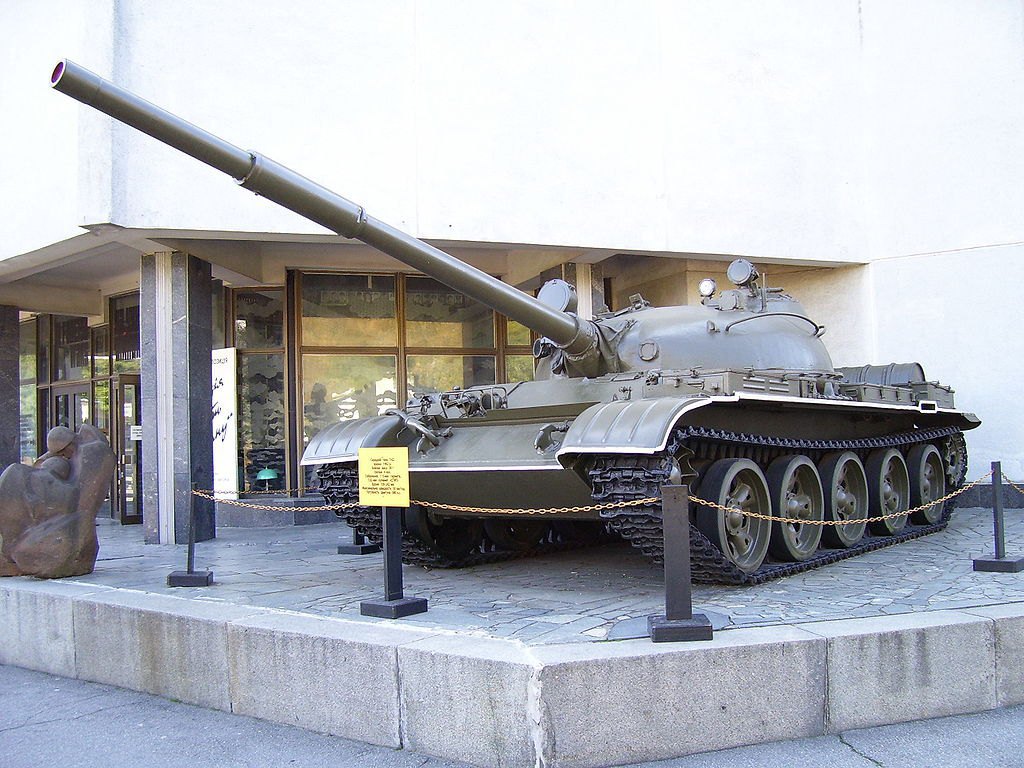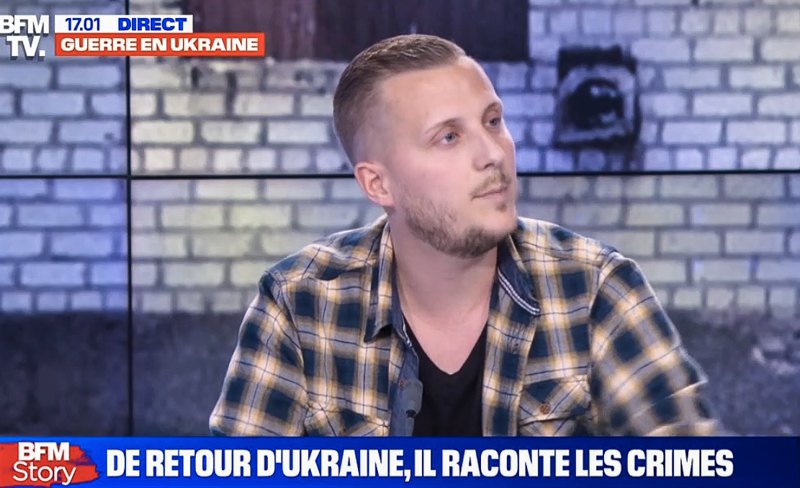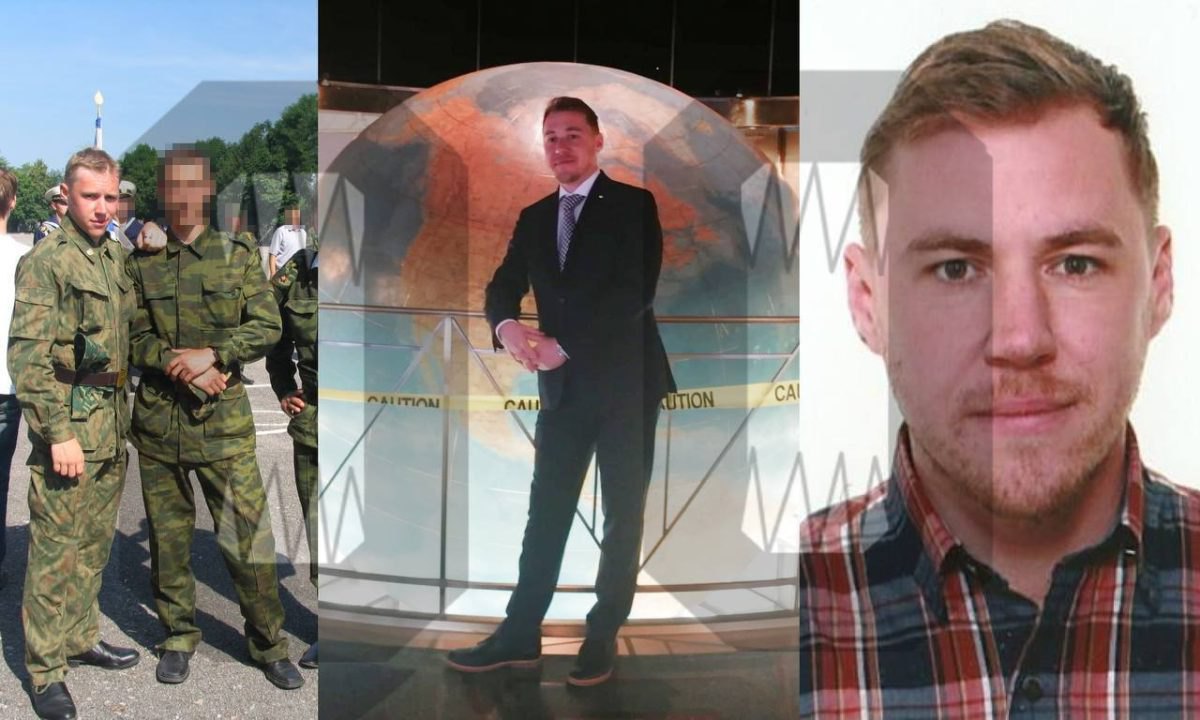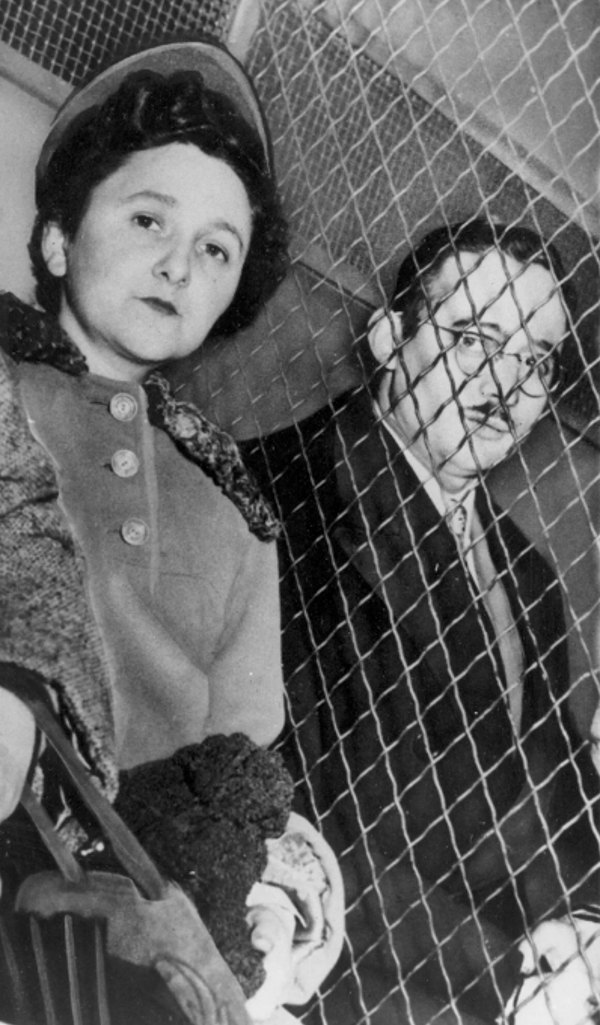
Ukrainians read with pleasure and satisfaction that the Russian troops begin to grab their old military equipment, in particular old tanks T-62s, out of their warehouses in Russia. Only about one in ten of them fits for some use in Ukraine. More and more archaic Russian air bombs are being thrown at Ukrainian cities and villages. Russians are forced to give out their old PPSH disk sub-machine guns to their soldiers because it was a ‘weapon of victory’ in the World War II. Old weapons, however, are still dangerous weapons. Inaccurate, crippled and fragile but they also could kill. A similar thing is happening in the information war. A Kremlin's Cold War-era agent community awakens around the world, so surprisingly antique, that one could hardly believe it is still alive somewhere. However, figuratively speaking, every tenth of those ‘sleeper agents’ also hits a target.
It is obvious that an ideologue of "denazification", based on a self-deception strategy of the ‘Russian World’, has failed. A Ukrainian ideological resource (a Eurocentric worldview, a high level of national cohesion, critical thinking) has been quantitatively and qualitatively quite different from the Russian agents’ reports to their hosts. First, Russia imprisons for true information, not pays for. Second, a traditionally inadequate perception of Ukrainians by Russians has created a false strategic narrative of a mass Ukrainian support for Putin's politics. A total hatred of the Ukrainian state and Ukrainian government has doomed both Russian information and Russian kinetic tactical operations to failure.
Current Moscow's large-scale information attacks are different and unfold mostly in the West. They are complex. A nature of the damage they cause resembles a passing cluster mine. Its striking elements fly far away from an epicenter of an explosion. They are waiting for their victim until a moment of contact with some source of information. Something explodes, affecting a human cognitive sphere, something does not. We traditionally react vividly to ‘means of delivery’ of an information poison, to imaginary ‘kissinger’ or ‘merkel’s messages’. But at a time of receipt their delivery turns out to be just an empty container.

I was ironic about a scale and most importantly pathos of a fight against fakes and simply published rebuttals in the media. The amount and quality of efforts spent were similar to aiming at ‘heat traps’ fired from an aircraft while reorienting its weapon. Fake is effective due to an inability to obtain alternative information and its target audience is not as wide as it seems at first glance. In all other cases it works as a reinforcing perception factor for a steady pro-Russian audience, which is not going to find out the truth of a proposed message. Such messages in their majority belong to a ‘black’ propaganda category (mostly for Western audiences), where a source of information does not exist, or ‘grey’/‘two-way’ propaganda (mostly for Ukrainians). Other kinds of messages contain ‘straw arguments’. Those are two pieces of information with a same tactical task, however, one of them discredits the other. A recipient of information automatically chooses less of two calamities along with an intensified disorientation of consciousness. Numerous debunking stand-ups of "good Russians" perform just the same function.
Current sources of direct hostile disinformation in the West are real individuals, who have a status of former military, specialized experts or journalists with an access to insider information. Dispatcher Carlos, who claimed that Ukrainian jets shot down MH17, was something exotic just not so long ago. There are battalions of such personalized liars. They use the same technology of gaining trust as marriage scammers: respectability, light mystery, emotional connection. Among them is Adrien Bocquet (Adrien Bocquet), a Frenchman, known for his May, 2022 stories about the ‘atrocities’ of the Azov Battalion and statements that horrors and cruelty of the Russian occupiers in Bucha against civilians were staged by Ukrainians. His lies were exposed by Ukrainian and French fact-checkers. Bocquet has been paralyzed for two years since 2010 and has become famous in France for his stories about fighting with his disease. Bocquet was promoted by a devoted Trump lover, 81-year-old journalist Andre Bercoff, a half-Russian born in Beirut. He was an experienced ‘mole’, close to French President Mitterrand and was the Chairman of French Press Club.

Here is another very fresh story. The fans to threaten our enemies with ‘the Hague’ will like it. A thirty six years old GRU agent Sergei Cherkasov, acting as Brazilian ‘citizen’ Victor Muller Ferreira, tried to enroll to an internship (just imagine) at the International Criminal Court. He could gain an access to sensitive information and influence major criminal proceedings. Dutch counterintelligence did not allow him to enter their country, noting about a high level of the agent's secrecy. Later, he was arrested in Brazil.
There are hundreds of such stories. The Russian Federal Agency Rossotrudnichestvo (active since 1925) in fact is a central office of the agent’s legal residency with ninety eight offices in eighty one countries. A few years ago, its budget was about a billion of Russian rubles (about seventeen million dollars US), however, the official figures still are closed. Since 2019, according to some public data, that budget has tripled and a billion of rubles has been allocated only for the study of foreign students (‘On the Creation of an Information System ‘Training for Foreigners in Russia’, Rossotrudnichestvo, 2019). This is just an average level of penetration of enemy agents. I have already written about a spy ‘infantry’ in a previous Part I of this publication.

It is more complicated with regards to a higher agent’s level. A peculiarity of human consciousness is to keep in focus some short fragments of time. It is not even a ‘clip thinking’, but a ‘mosaic’ one. A lack of critical thinking happens because of a growing emotional overload which no longer encourages a person to connect individual events in a logical sequence. A peculiarity of an event scale and its timeline do not allow consciousness to adequately accept such logical reasoning.
There is a famous legend about four blind sages and an elephant. Each of them held on to some part of the elephant and described it according to their tactile sensations. Once in times of my early literary years, I wrote a story ‘The Fifth Sage’, suggesting that there was another man who held on between the elephant's hind legs. I do not know how intimate that expressive elephant’s part and its interpretation could be but the fifth sage did not communicate his secret tactile knowledge to the world because of moral and ethical reasons. It remained for gurus. Therefore, a number of Russian ‘old’ agents of influence in the political circles of the world is, in fact, of the same ‘elephant’ scale which is inconvenient to talk out loud.
A Soviet foreign intelligence history begins in the 1920s. Since 1927 a Foreign Unit of the Special Department of the Chrezvychaynyi Komitet (Russian Extraordinary Committee/VChK) acquired a status of a separate organization. Before a collapse of the USSR a Soviet intelligence system consisted of: (1) Foreign Intelligence (the cooperation with the socialist countries’ authorities and others was included in its functions after December 20, 1920) and (2) Military Intelligence ‘GRU’ (the Main Intelligence Directorate at the General Staff of the Ministry of Defence). Recruitment to both was carried out on mainly ideological grounds. In 1930s the so-called ‘Cambridge Five’ were recruited in England: (1) Kim ‘Stanley’ Philby, whose first task was to spy on his farther, an orientalist, (2) Donald Duart ‘Homer’ Maclean, (3) Anthony ‘Johnson’ Blunt, (4) Guy ‘Hicks’ Burgess and (5) John ‘List’ Cairncross). All five held senior positions in British intelligence and diplomatic structures. Only a few years ago ‘The Financial Times’ suggested that a spy network was actually larger (a case of Cedric Henning Belfrage). They (and a dozen of unknown others) were recruited and sent to British intelligence, counterintelligence and the British Foreign Ministry by an illegal agent Arnold ‘Stephan’ Deutsch, who taught those five, then-students at Cambridge University, England. Another KGB agent James Klugmann was also a Cambridge professor and helped Deutsch.

Even at that time a high-level Soviet agent network ‘reached’ the very top of Western political establishment. After the World War II Soviet spies had a very favourable operational situation because the communist ideas were popular in the world. However, some recruitment measures were changed a bit. It was not recommended, for example, to involve members of the Communist parties in their countries into spying. Those agents in a public sphere could act from more ‘independent’ positions and easily move up a career ladder. The epicenters of such complex information and political influences in Central Europe were France and Germany. The latter gained its activities especially after a reunification with its Eastern lands. We are still victims of the Kremlin's ‘cult of de Gaulle’-a man who withdrew France from NATO in 1966 and even during the World War II pursued harsh anti-American policies. Roosevelt called such policies as an example of ‘brilliant poisonous propaganda’. As I said earlier, morality was no longer bothered. For example, Heinz ‘Paul’ Felfe, a leading intelligence officer of Germany, who was recruited by the KGB, served once as an Obersturmführer SS.

A history of the Russian influxes into the United States is a separate topic. I would like to briefly mention that until about mid-1970s Americans resisted to Russian influences with dignity. Until hippie-era Komsomol members grew up and came into big politics. The Russian inflows spread across the French-speaking world from France as well as the German-speaking Russian influences spread further from Germany. Austria was the first victim.
Practical Implementation
An ‘old’ agent of influence does not have to hold the highest government positions, although this is not an exception to the general rule. It is rather a high-level clerk or an experienced emeritus with long-time influential friends in an elite golf club or a so-called ‘old school tie’. It is important that a document flow around a statesman should be composed in such a way and with such accents that a top speaker had no options for interpreting reality, except of stuff necessary for an agent.
Any policy of the major Western countries is a result of complex budgetary compromises, in which ideology does not appear as a decisive factor. Ideological preferences have been a rarity for a long time over there. Therefore, an influence of the great state or continental patriotism, which is lobbying by an agent, is invulnerable in terms of personal reputation, but works well for spreading the Kremlin's ‘divide and rule’ ideology. It does not have a constant impact. It is like a submarine that pops up in an unexpected place, strikes by a rocket and plunges back to unattainable depths. The submarine could be very old but surprise, place and time are important hitting factors.
It is worth to mention about top Western media. We still carry a false communist post-Soviet propaganda’s idea that all Western media, without exception, adhere to some fantastically true standards of information delivery. Each publication has its own history, audience and its own owners. There are, as well, good old friends of the owners. European and overseas publications of the same piece might differ. There are editorials and there are ‘a reader wrote to the newspaper’ pieces. Ukrainians have a rough idea of what ‘The Sun’ newspaper is, but we still put an ideological equality sign between, for example, ‘The Washington Post’ and ‘The New York Times’. There is freedom of speech, which allows a quite reasoned point of view, especially if it is state one.
It is naive to believe that agents are constantly experiencing some fear of exposure as in some mediocre spy thriller films. Counterintelligence is too closely intertwined with politics, especially electoral ones. CIA ex-Chief Alain Dulles, the first civilian director of the US Central Intelligence Agency, said that ‘Cambridge Five’ was ‘the most powerful intelligence group since World War II’. Despite surveillance three of them escaped to the USSR, one received a year in prison and one was not persecuted at all. It is quite difficult to prove ones participation in spying in favor of another state. Much easier was to condemn the Rosenberg couple (Julius and Ethel Rosenberg) in a crime of sharing a nuclear bomb creation technology with the Communists.

An invisible world of intelligence networks is generally well-informed, especially when it comes to war veterans. Everyone once had a contact with someone, though they were probably just the innocent ‘sins of youth’. The Cold War officially ended after the Maltese Summit in 1989. Information about it had been hidden, similar to hidden radioactive soils in the Chernobyl forest: try to dig it a little deeper and you will get a serious, often fatal radiation exposure. It was tested by Russian military in the Spring-2022. In my opinion, the Cold War has never ended. There were the ‘Minsk Agreements’, which by mutual consent turned a blind eye to the loss of ideological positions of the West in Eastern Europe. It enabled the Kremlin to regroup, increase its intelligence efforts and launch a massive information invasion under flags of a threat to Russian-speaking territories and a ‘Russian Mir’ expansion along with energy and nuclear blackmail.
Moscow has a current operational advantage in the information influence in the West because in fact it has never lost the Cold War. ‘Old’ agents of influence are like tumors that have penetrated so deeply into a body of a country’s establishment that its surgery can jeopardize vital functions of the entire state organism. It automatically entails a question to various political predecessors due to whom all that ugliness happened. All similar developments have fully affected Ukraine. On the one hand, influential and rich Ukrainians, who for years have openly worked Russia and felt great, are well known. Their own ideology did not matter to them, especially since they could easily change it to the opposite, depending on the situation. Medvedchuk, a famous Ukrainian ‘scapegoat’ is rather a forced gesture and a nod to the Ukrainian civil society. This does not apply to actual spies and serious agents of influence whom the Security Service of Ukraine/SBU has been currently dealing with. Obviously, it is better for Ukrainian politicians and political scientists to comment on this. An ‘out of time’ approach, employed by the Ukrainian lawmakers and quite beneficial for agents, immediately comes along. It is a risky and dangerous business to detonate an old Russian ammunition. Its remote blowout employing information operations is definitely more efficient.








